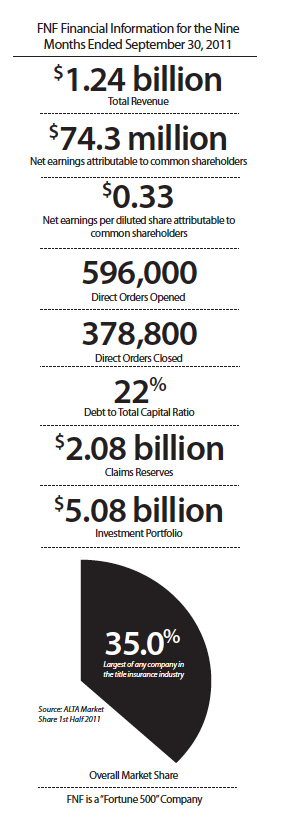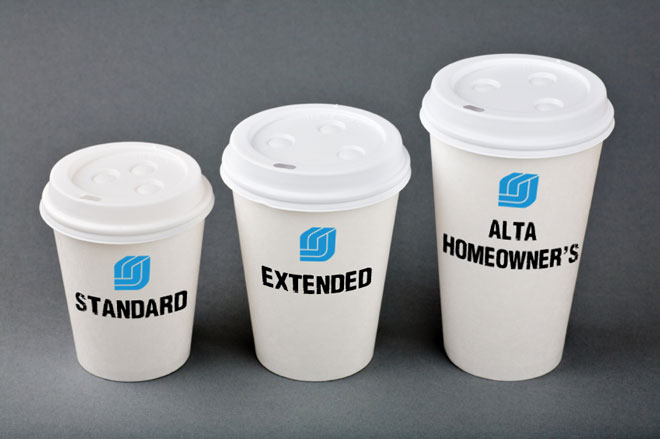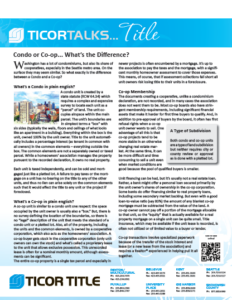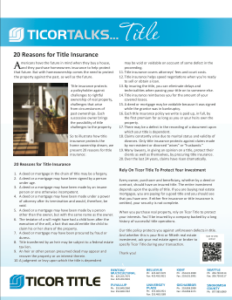
Leading the way.
The FNF Family of Companies is the leader in the industry. Being the leader is not always easy. Many times we are the first ones who uncover the latest schemes and, as a result, issue a new policy and procedure. It is our settlement agents who are on the front lines implementing the new policy and often hear, “No other company makes us do this!”
This story illustrates just how important it is for us to follow the Company policies and procedures even if no one else requires them.
Joy Turner, senior escrow officer for one of our sister branches, opened a sale transaction. The seller was in the process of negotiating a short sale with his lender, Bank of America, through the services of a third-party short sale negotiation company. There were no real estate agents involved. The buyer was purchasing the property using a private lender and the sales price was $200,000, pending approval from the existing lender.
On June 10, 2011, Bank of America issued their short pay letter approving the sale for $200,000. Per the letter, the closing was to take place no later than June 27, 2011. As the 27th approached, it was clear the buyer and seller were not going to meet this deadline. It did appear the transaction was going to close, but they just needed an extension of a few days. Joy told the seller she would need a revised letter extending the closing deadline.
The new lender’s funds came in on June 28, 2011 and so did the extension letter from Bank of America. The new deadline for closing on the short pay letter was July 1, 2011. On the morning of June 29, 2011 Joy worked to get everything together for recordation and disbursement. Per Company policy, Joy knew she needed to contact the loss mitigator at Bank of America to confirm the terms and amount shown on the short pay letter.
Something’s Fishy
Something about the extension letter and HUD-1 approval Joy received from Bank of America didn’t look right. First, the communication did not come through www.equator.com. This was unusual since approval letters were delivered using this online system for every Bank of America short sale Joy had closed recently. Joy picked up the phone and called the person named on the HUD-1 approval. His name was Vitto Pastor. Joy found it odd his title shown on the approval letter said Senior Operations Analyst, Business Operations, since it is usually a loss mitigator who issues short pay approvals. She left him a message.
“…according to their records, the seller had never applied for a short sale”
Shortly thereafter Joy received a returned phone call but it wasn’t from Pastor. It was Kenneth Teele, senior investigator at Bank of America. Kenneth advised her Pastor did work for Bank of America – but not in their Loss Mitigation Department and Pastor did not issue the HUD-1 approval letter. Kenneth went on to explain the HUD-1 approval and short pay letter she received were fraudulent and, according to their records, the seller had never applied for a short sale. He also revealed the outstanding loan balance for this loan exceeded one million dollars.
Joy left a message for the seller to call her, stating there was a problem with the short pay approval. Instead of returning her call, the seller e-mailed Joy asking her to send him copies of everything he signed, including the short pay letter. Joy again asked him to call her, but he responded by saying he was in a meeting and would call later. He never did.
The Buyer’s Perspective…
The buyer called to find out if his file had closed. Joy was in another closing so she asked one of her colleagues to tell him we would not be closing as the short pay letters were invalid. The buyer’s only response was, “Oh really?” Joy also attempted to contact the third-party negotiation company who never answered the phone or responded to her calls or e-mails.
The buyer’s lender contacted Joy on July 1, 2011, asking her to return the loan funds to them. Joy verified with her Operational Accounting Department the funds were being sent back to the same account they came from and reported the incident to her manager, Lisa.
Lisa shared the details with all the escrow officers in her operation and notified National Escrow Administration. Turns out, this was the 15th time our Company had been the target of this scheme. The bad news is, 14 of these closed and our claims department is currently working on them. The good news is Joy Turner prevented us from falling prey a 15th time.
Moral Of The Story
Joy’s transaction involved a $200,000 short sale on a loan with a balance of more than one million dollars. Had Joy accepted the short pay letter and closed, Bank of America would have rejected the nearly $200,000 short pay. The Company would have had to either unwind the deal or face a potential loss of more than $800,000 to obtain a lien release, and deliver both free and clear title to the insured buyer, and a first lien position to their new lender.
Following Company policy can seem cumbersome, but this story proves it is well worth the extra effort.
Questions or comments? Please share below!
 Ticor Title is a member of the Fidelity National Financial family of companies (“FNF”); the leading provider of title insurance through its title insurance underwriters – Fidelity National Title Insurance Company, Chicago Title Insurance Company, Commonwealth Land Title Insurance Company and Alamo Title Insurance. FNF underwriters issue more title insurance policies than any other title company in the United States.
Ticor Title is a member of the Fidelity National Financial family of companies (“FNF”); the leading provider of title insurance through its title insurance underwriters – Fidelity National Title Insurance Company, Chicago Title Insurance Company, Commonwealth Land Title Insurance Company and Alamo Title Insurance. FNF underwriters issue more title insurance policies than any other title company in the United States.





